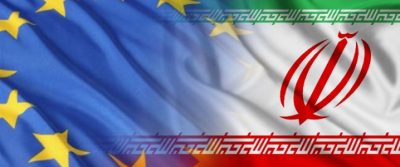How the EU Is Helping Iran Skirt U.S. Sanctions. Sets Up Countervailing Financial Entity

At the UN General Assembly on Tuesday, U.S. President Donald Trump was laughed at by global leaders when he boasted about his accomplishments. He may feel insulted by the reception he got in New York, but a day earlier his administration saw a more tangible display of how much the international community opposes some of his policies.
On Monday, the European Union announced a decision to launch a “special purpose vehicle” with the mission of helping Iran blunt the impact of U.S. sanctions. Iran is still in compliance with its obligations under the 2015 nuclear deal, according to the International Atomic Energy Agency, and the P5+1 signatories – aside from the U.S. – remain firmly in the deal. “We are not backing down [on the Iran nuclear agreement],” said a European diplomat, according to the Wall Street Journal.
The U.S. is nearly friendless in its quest to tear up the Iran nuclear deal, save for Saudi Arabia and Israel, and the EU’s initiative is intended to keep the accord alive. China and Russia offered their support for the new financing vehicle.
But, despite their support, Iran has been hit hard by U.S. sanctions as the world dials back on its purchases from Iran. The Iranian rial has plunged in value this year and oil exports are expected to continue to decline. Without the benefits of the nuclear deal, Iran has little incentive to remain in the accord and may eventually bow out.
“Mindful of the urgency and the need for tangible results, the participants welcomed practical proposals to maintain and develop payment channels, notably the initiative to establish a Special Purpose Vehicle (SPV) to facilitate payments related to Iran’s exports, including oil,” Britain, China, France, Germany, Russia and the EU announced in a joint statement. The goal is “to protect the freedom of their economic operators to pursue legitimate business with Iran.”
The EU’s plan consists of an entity setup for the sole purpose of processing payments for companies doing business with Iran. This would allow European companies to buy oil from Iran without fear of getting hit by U.S. sanctions. The trade would presumably take place in a currency other than the greenback because of U.S. sanctions on dollar transactions.
To be sure, the U.S. still wields unparalleled power over the fate of Iran’s oil exports, and has already succeeded in disrupting a larger share of Iranian supply than most analysts had predicted. Estimates from earlier this year pegged Iran’s losses at around 400,000-500,000 bpd, but more recent estimates put the losses at 1 million barrels per day (mb/d), or perhaps even more, by the end of the year. Iran’s oil exports fell to 3.584 mb/d in August, down 150,000 bpd from a month earlier.
The ability of the U.S. to demand compliance from so many countries is a testament to the power of the American-oriented international financial system and the strength of the dollar as the world’s reserve currency. Still, there are those that believe the aggressive use of sanctions will backfire on the dollar in the long run. In the future, the effort by the P5+1 nations to setup an alternative payments system may be viewed as a turning point, a small but highly symbolic attempt at undermining dollar dominance.
In the short run, it is unclear if the effort will have an impact.
“The question is whether this will work, because of course the US will continue to exert colossal pressure on the European Union and, with a strong desire, can easily trample down any mechanism,” Vladimir Yermakov, director of the department for non-proliferation and arms control at the Russian foreign ministry, told reporters, according to the FT. “Everything depends on how far the Americans want to go and how far our European colleagues will allow them to go.”
It is not clear that European companies will be convinced to trust the “special purpose vehicle” setup by the EU or that buying Iranian oil will go unpunished by Washington. Already, Total SA has withdrawn from a major natural gas project in Iran, and other major European companies such as Peugeot, Renault and Siemens have also suspended their Iranian operations. There is little prospect of their return.
Refiners in Europe have dramatically cut their imports of Iranian oil, which has been an important factor in the decline of Iran’s oil exports. That also seems unlikely to change.
Without the decisions by individual private companies to continue to do business with Iran, the EU initiative could be rendered symbolic. Time will tell.
*
Note to readers: please click the share buttons above. Forward this article to your email lists. Crosspost on your blog site, internet forums. etc.
Featured image is from the author.

